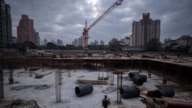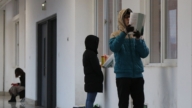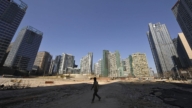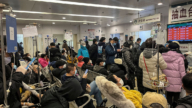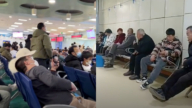【新唐人2012年8月15日訊】大陸勞動密集產業聚集的閩三角——廈門、泉州等地區,包括運動鞋、男裝、雨傘業等輕工業出現了停工潮。據大陸媒體報導,由於「無錢可掙」,大批工廠出現「不忙生產忙(出)租房的窘境」。而專家和企業主都認為,這在中國是一個普遍現象。
大陸沿海地區除珠三角、長三角經濟區之外,就屬閩三角地區是輕工業工廠的集中地。有大陸媒體最近實地查訪廈門、泉州等地發現,當地工業園區出現「不忙生產忙(出)租房」現象。曾經火熱的招工廣告,被廠房出租所取代。
報導說,當地「1棟5層廠房只剩數十員工」的情況比比皆是。由於「無錢可掙」企業主爭相出租廠房。有老闆抱怨「貸款利息加上增值稅和地方稅費」,毛利只剩10%,上億銷售額最後利潤只剩一兩百萬元人民幣,若倒楣碰上客戶倒帳就整年白幹,不如出租廠房「輕鬆賺」。有相當一部分中小企業主對「做工廠」的遠景,信心產生動搖,出現「收攤子」心態。
經常往返於沿海地區的貿易商王先生向《新唐人》介紹,由於出口產業蕭條,廠房的出租率和租金也像溜滑梯一樣下滑。過去小型一千多平方米的廠房年租金幾十萬,可能還找不到。而報導說,目前廈門工業區一平方米租金8到12元人民幣。
大陸貿易商王先生:「現在去租廠房很多呀,價格差不多縮水了百分之七、八十,很便宜現在。基本上情況都差不多,能夠出租的工廠狀況還算可以,很多就直接賣掉、直接倒閉掉了。」
受訂單萎縮影響,輕工業如服裝、鞋子、雨傘等產業衝擊最大,主要因素是利潤太低。
王先生:「第一個,直接倒閉掉了,為了還債就把工廠賣掉,或者,賣不掉就先租出去。第二種就是工廠的規模縮小,很多的廠房騰出來沒用,有些就直接租出去。還有一些乾脆就轉型了,空心化了,直接把資金騰出來。」
報導還說,現在國家宣導企業轉型升級,但要落實於基層談何容易。而王先生分析,在大陸,民營企業受制於資金、技術和管理,要轉型是不可能的事。
王先生:「民營企業去銀行貸款很難的,而且銀行的利率很高。如果投入資金搞技術升級去轉型,那利潤回報很低的,因為你沒有一個專利保護。第三個,我們華人的管理制度跟歐美差距很大的。少數幾家龍頭企業可能有這個實力轉型,民辦的實業基本上就是,一直堅持到撐不下去為止再關門。很少能夠出現轉型,很難的。」
美國「南卡羅萊納大學艾肯商學院」教授謝田分析,投資獲利出現窘迫的狀況,是中國整體經濟形勢放緩,進入停滯現象的反映。
美「南卡羅萊納大學艾肯商學院」教授謝田:「這我想不只是在廈門這些地區,也是珠三角、長三角的問題。現在這實際上已經是一個全中國普遍的現象。最近中國報告出來的經濟增長數字,甚至被美國《華爾街日報》質疑,還有其他西方媒體感到非常吃驚,就是再沒辦法相信中國的數據了。」
謝田指出,中共當局由於經濟陷於停滯,處於「滯脹」狀態;在嚴峻的經濟狀況之下,只能延續過去的一貫作法,在數字上搞欺騙。他說,目前,中國經濟與國際經濟形勢同樣處於危機狀態,廈門、泉州等地的中小企業受到挫折,也就並非不尋常了。
採訪編輯/梁欣 後製/李月
Fujian Manufacturers Hit Hard
Southern Fujian industrial area goes through critical times.
Light industries like, clothing and shoes, are hit the worst.
According to Mainland media reports, the manufacturing
is down and industries are renting their factory buildings.
However, experts and entrepreneurs believe
this is a common phenomenon throughout China.
Besides the Pearl River Delta and Yangtze River Delta, most
of light industry labor is concentrated in the Fujian triangle.
Recently, some Mainland media carried out onsite
investigation in Xiamen and Quanzhou.
They discovered the phenomenon of factories renting out
buildings and easing on industrial production.
The once popular “help wanted” advertisements
have been replaced by “buildings for rent.”
Reports say it is common to see a five floor building
left with only a few dozen employees.
Since there is no money to earn,
industry owners compete to rent the buildings out.
Some owners complain that after interest, local taxes
and value-added tax, only 10% of gross profit is left.
Only 1 or 2 million RMB is left
from several hundred million RMB worth of sales.
If they are unlucky and encounter a client with bad debts,
an entire year of their work is wasted.
Thus they think it is better
to rent and earn some easy money.
A considerable amount of medium and small size business
owners waver in their confidence in starting a business.
They feel it is time to “wrap it up.”
Merchant Mr. Wang, who often travels between China’s
south coastal industry areas, was interviewed by NTDTV.
He said, due to export’s bleak state, the rate which factory
buildings are rented out and the rent are sliding down.
In the past, it was hard to find a small factory place
for several dozen thousands of RMB.
But now, one square meter rents
for only 8-12 RMB in Xiamen.
Mr. Wang (Merchant): “Now there are many factory spaces
for rent, the price shrank by about 70 to 80 percent.
It is very cheap now.
Basically they are all around this price.
The factories that are able to rent out are still alright,
but a lot of [owners] just sell or close down their factories.”
Due to a decrease in purchasing orders, light industries like
those for apparels, shoes and umbrellas are worst affected.
The main reason is profits are too low.
Mr. Wang: “The first option is to close down or sell in order
to pay back debts. If they are unable to sell, they rent.
The second is to downsize the factory,
a lot of rooms which are not used get rented out.
Some just transformed and directly freed up their fund.”
Reports say, China promotes corporate restructuring and
upgrading, but it is not easy to apply it at a grass root level.
Mr. Wang analyzes, private enterprises have limited funds,
technology and management, it is very hard to restructure.
Mr. Wang: “It is hard for private enterprises to get loans
from banks, and interest rates are very high.
If investing in the technical aspects and restructure that way,
profits are very low as you are not protected by a patent.
Another problem is Chinese people’s management is very
bad compared to Americans’ and Europeans’ management.
Maybe a few leading enterprises have the actual capability
to restructure, but private enterprises basically hold on until they can, then they shut down.
Very few restructurings have taken place.
It is very hard.”
Professor Xie Tian at the University of South Carolina
Aiken School of Business analyzes the situation.
He thinks, the issue of investment earnings is a reflection
of China’s economic slowdown and entering stagnation.
Xie Tian: “I think this is not only a problem in Xiamen area,
but also in the Pearl River Delta and Yangtze River Delta.
In reality, this is already a common phenomenon
all over China now.
Recently the numbers from China economic reports
were questioned by the Wall Street Journal.
Other western medias felt very shocked too,
they cannot believe China’s statistics anymore.”
Xie Tian points out due to economic stagnation and a state
of stagflation, there is only one thing CCP can do.
Under such a grim economic condition it can carry on
with its ‘good old’ practice – to misrepresent the numbers.
He said, similar to the global economic situation,
China’s economic situation is in a risky state too.
It is not unusual for the medium and small size enterprises
in Xiamen and Quanzhou to experience such setbacks.








